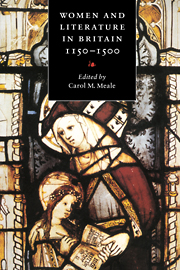Book contents
- Frontmatter
- Contents
- List of illustrations
- List of abbreviations
- Chronology: women and literature in Britain, 1150–1500
- Introduction
- 1 The power and the weakness of women in Anglo-Norman romance
- 2 Women as lovers in early English romance
- 3 Mothers in Middle English romance
- 4 ‘Clerc u lai, muïne u dame’: women and Anglo-Norman hagiography in the twelfth and thirteenth centuries
- 5 Women in No Man's Land: English recluses and the development of vernacular literature in the twelfth and thirteenth centuries
- 6 ‘Women talking about the things of God’: a late medieval sub-culture
- 7 ‘… alle the bokes that I haue of latyn, englisch, and frensch’: laywomen and their books in late medieval England
- 8 Women authors and women's literacy in fourteenth- and fifteenth-century England
- 9 Women and their poetry in medieval Wales
- Further reading
- Index of manuscripts
- Index of names and titles
Introduction
Published online by Cambridge University Press: 09 November 2009
- Frontmatter
- Contents
- List of illustrations
- List of abbreviations
- Chronology: women and literature in Britain, 1150–1500
- Introduction
- 1 The power and the weakness of women in Anglo-Norman romance
- 2 Women as lovers in early English romance
- 3 Mothers in Middle English romance
- 4 ‘Clerc u lai, muïne u dame’: women and Anglo-Norman hagiography in the twelfth and thirteenth centuries
- 5 Women in No Man's Land: English recluses and the development of vernacular literature in the twelfth and thirteenth centuries
- 6 ‘Women talking about the things of God’: a late medieval sub-culture
- 7 ‘… alle the bokes that I haue of latyn, englisch, and frensch’: laywomen and their books in late medieval England
- 8 Women authors and women's literacy in fourteenth- and fifteenth-century England
- 9 Women and their poetry in medieval Wales
- Further reading
- Index of manuscripts
- Index of names and titles
Summary
I saye to the agayne and doubte neuer the contrary that yf it were the custome to put the lytel may dens to the scole and sewyngly were made to lerne the scyences as they do to the man chyldren, that they sholde lerne as parfytely, and they sholde be as wel entred in to the subtyltes of al the artes and scyences as they be, and peraduenture there sholde be mo of them, for I haue touched here tofore by ho we moche that women haue the body more softe than the man haue, and lesse habyle to do dyuers thynges, by so moche they haue the vnderstandynge more sharpe there as they apply it.
Christine de Pizan, Livre de la Cité des Dames (1405), tr. Bryan Anslay (London: Henry Pepwell, 1521)yong women, maydenes, shulde be putte vnto scole to lerne vertous thinges of the scripture, wherethorughe thei may the beter see and knowe thaire sauuement, and to duelle and for to eschewe al that is euel in manere … How be it there be suche men that haue opynion that thei wolde not that her wyues nor her doughtres shulde knowe no thinge of the scripture; as touchinge vnto the holy scripture it is no force, thoughe women medille not nor knowe but litelle therof but forto rede, eueri woman it is the beter that canne rede and haue knowinge of the lawe of God, and forto haue be lerned to haue vertu and science to withstonde the perilles of the sowle, and forto use and excerse the werkys of thaire sauement, for that is thinge aproued and necessarie to alle women.
Le Livre du Chevalier de la Tour Landry (c. 1372), anon. English translation, temp. Henry VI (1422–61)- Type
- Chapter
- Information
- Women and Literature in Britain, 1150–1500 , pp. 1 - 6Publisher: Cambridge University PressPrint publication year: 1993



